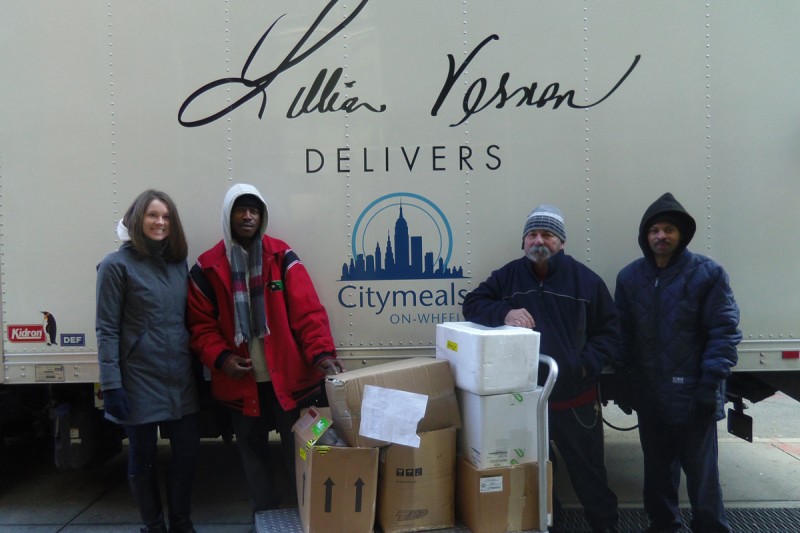
Postdoctoral fellow Allysia Matthews (left, shown with Citymeals-on-Wheels staff) initiated a program to donate reusable ice packs.
Some 18,000 of New York City’s homebound elderly rely on the meals that are delivered daily to their doors by Citymeals-on-Wheels , a nonprofit organization that distributes more than two million meals to New Yorkers each year.
Government guidelines require food to be transported at certain temperatures to prevent spoiling. Meeting those guidelines just got a little easier for the Citymeals-on-Wheels program thanks to regular donations of cold packs from Sloan Kettering Institute laboratories.
Helping the Local Community
The idea for the cold-pack reuse program began in the laboratory of immunologist Jayanta Chaudhuri when postdoctoral fellow Allysia Matthews noticed that perishable supplies such as enzymes, antibodies, proteins, and solutions were arriving in packages that included reusable freezer packs.
“The idea for recycling them came from the growing pile of ice packs in our freezer,” says Dr. Matthews. She is a member of the Green Labs Committee, which focuses on waste reduction, energy efficiency, and green products in Sloan Kettering Institute labs. The lab would reuse the ice packs to ship samples to other labs, but, she says, they were still throwing out “a lot of perfectly good ice packs.”
Curious, Dr. Matthews did some investigating and learned that the University of Rochester in upstate New York was donating its ice packs to the local Meals on Wheels group. Dr. Matthews contacted Citymeals-on-Wheels and discovered that no other hospital or research institution in New York City was donating its cold packs. Since the program began in October 2013, Memorial Sloan Kettering labs have donated more than 4,000 pounds of cold packs to the organization, which it picks up and distributes to local meal providers to use in their thermal food delivery bags.
Aid for Hospitals Abroad
Since 2011, Memorial Sloan Kettering staff members also have collected thousands of pounds of medical supplies and donated them to the Afya Foundation. Afya’s mission is to recover surplus medical supplies, hospital equipment, and humanitarian provisions from New York’s healthcare, corporate, and private communities to support ongoing health initiatives, primarily in Africa and the Caribbean.
Examples of donated items include surgical supplies, unused research kit supplies, medical equipment such as instruments and diagnostic and lab tools, and office furniture. Donations collected by Afya in 2013 from Memorial Sloan Kettering and other healthcare institutions supported heart surgeons in Nicaragua, contributed to the opening of three new hospitals in Africa, and filled 100 duffel bags with consumable supplies for a mission in Botswana.
Memorial Sloan Kettering employees also volunteer their personal time to help transport items to Afya and to sort donated items at the Afya warehouse.
“We understand we are members of a larger community,” says Cynthia McCollum, Senior Vice President of Hospital Administration and Chair of the Green Team Committee, which was formed in 2009 to identify opportunities to reduce waste and conserve resources. “We are committed to doing our part to reduce the institution’s environmental impact.”



